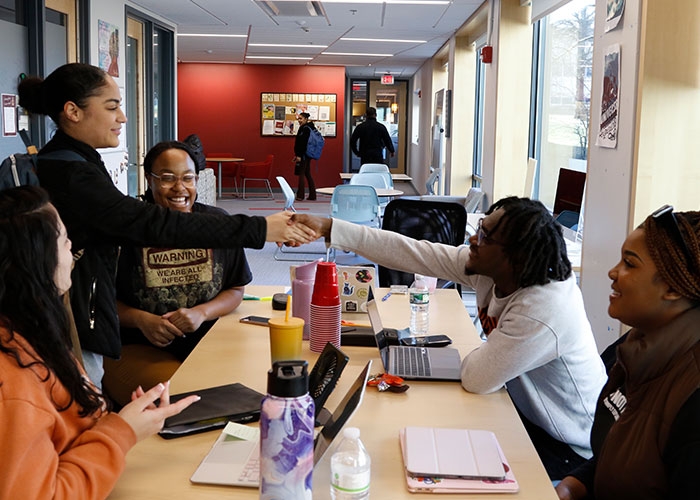RIC’s PEP Program – a Prescription for Success
- News & Events
- News
- RIC’s PEP Program – a Prescription for Success

RIC’s PEP Program provided a solid college foundation for Jinnette Santana.
“I’m very ambitious. When I first toured Rhode Island College, I thought, ‘I can leave a legacy here’ and not just as a first-generation college student. As a native of Central Falls, I want to bring change to my community. I felt like Rhode Island College would give me that opportunity.”
These are the words of sophomore Jinnette Santana who enrolled at RIC fueled by years of activism at her high school – Blackstone Academy Charter School in Pawtucket. There, she had been a member of the Black Leadership Initiative, a group of students who worked to create change in the community. Among their activities was to stage a protest at the State House following the killing of George Floyd.
She was also a member of BACS 2.0, another student group focused on creating change in her high school. Their activities included having a seat at the decision table with the teachers and school counselors to change the school's grading system to a proficiency-based system of which they were successful.
Empowered by these experiences, Santana enrolled at RIC, knowing that Rhode Island College would prepare her for the world, and RIC’s PEP Program was there to lay the foundation.
PEP stands for Preparatory Enrollment Program. It’s a comprehensive support service at Rhode Island College for first-year students. The supports that PEP provides are designed to complement the student’s education. PEP helps them immerse themselves into college life and empowers them to reach their educational goals in a positive and supportive environment.
She was able to utilize advisors from Student Support Services who, she says, have had a profound influence on her capacity to grow as a student.
“During my freshman year, my advisor would ask me things like how I’m liking my first year, what classes I’m taking, how many credits I’m taking, what’s my GPA, what are my academic goals – basically everything. I was given a lot of guidance.”
Still, Santana struggled. Though she’s never been afraid to use her voice to help others, there was a point in her freshman year when she was afraid to speak out and help herself.
“In my freshman year I had declared biology as my major, but I was struggling with my courses and my GPA fell. Rather than let my PEP advisor know that I was struggling, I kept it to myself,” she says.
After Santana confided in a coworker, she was able to climb out of that hole and find her true calling – social work, which is now her major. She also went from being on academic probation in her freshman year to becoming a Student Support Services tutor in math and Spanish in her sophomore year.

Most of all, the PEP program is a community of caring, Santana says.
“PEP students form strong bonds,” she says. “We spend a lot of time with each other. We study together, we play board games, we converse. We never keep it at a ‘Hi/Bye.’ We really get to know each other and care about each other.”
“If you’re starting your first year at RIC as a PEP student,” Santana advises, “don’t worry about feeling out of place. You’ll be supported. One hundred percent you’ll get that support from your advisors, but you also have to do your part. It’s 50-50. They can talk to you about your goals, they can talk to you about your struggles, but you have to do your part.”
Ultimately, the PEP program has ticked many boxes for Santana. Visit the PEP Program to learn more.
